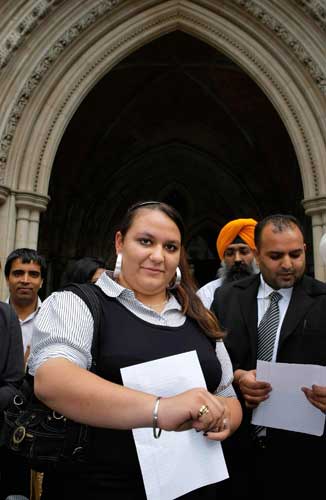High Court backs girl barred from wearing bangle

Your support helps us to tell the story
From reproductive rights to climate change to Big Tech, The Independent is on the ground when the story is developing. Whether it's investigating the financials of Elon Musk's pro-Trump PAC or producing our latest documentary, 'The A Word', which shines a light on the American women fighting for reproductive rights, we know how important it is to parse out the facts from the messaging.
At such a critical moment in US history, we need reporters on the ground. Your donation allows us to keep sending journalists to speak to both sides of the story.
The Independent is trusted by Americans across the entire political spectrum. And unlike many other quality news outlets, we choose not to lock Americans out of our reporting and analysis with paywalls. We believe quality journalism should be available to everyone, paid for by those who can afford it.
Your support makes all the difference.A Sikh schoolgirl who was excluded from her school for refusing to remove a religious bangle has won her High Court battle after a judge decided that the school's actions were unlawful under Britain's race and equality laws.
Sarika Watkins-Singh, 14, was forced to take lessons in isolation for two months before being excluded from at Aberdare Girls' School last November because she refused to take off her kara, a slim steel bracelet that constitutes one of five religious symbols observant Sikhs are expected to wear at all times.
The school argued that Sarika's kara broke its "no jewellery" uniform policy which only allowed pupils to wear watchbands and plain ear studs. But yesterday Mr Justice Silber ruled that the kara was of "exceptional importance for religious and racial reasons" and that Sarika had therefore been the victim of "indirect discrimination on the grounds of race and religion" under the Race Relations Act and the Equality Act.
Shortly after the judgment was announced, Sarika stood on the steps of the High Court holding her kara aloft and said: "I am so happy to know that no one will ever have to go through what me and my family have gone through and no other pupil will ever get banned from wearing their kara again ... I am proud to be a Welsh, Punjabi, Sikh girl."
Anna Fairclough, a lawyer from the civil liberties group Liberty which represented the Singh family, said: "This commonsense judgment makes clear you must have a very good reason before interfering with someone's religious freedom. Our great British traditions of religious tolerance and race equality have been rightly upheld today."
During the court case the school tried to compare the kara to the Welsh flag, describing it as a symbol that engendered strong emotions but which was not a requirement of a culture or religion. But Justice Silber called the comparison "seriously erroneous" because "it totally ignores the critically important religious significance of a kara which is not shared by the Welsh flag."
He also rejected the school's suggestion that their refusal to admit Sarika was similar to a number of recent successful court battles won by schools against Muslim pupils who have insisted on wearing full-length veils in contravention of their uniform policies.
"There is an enormous difference between these very noticeable garments and the unostentatious kara which permits the wearer to wear every other aspect of the uniform policy," he said.
The ruling is a major victory for Sikh campaigners. Aberdare Girls' School will have to readmit Sarika with her kara unless it seeks permission to appeal from the Court of Appeal. Under British law Sikhs, like Jews, are defined as a race as well as a religious group from a landmark 1983 ruling by the House of Lords that enshrined the right for Sikh boys to wear turbans in school. Dabinderjit Singh, a leading figure from the Sikh Federation, said: "Twenty-five years later we have had to return to the courts to fight for a new generation."
Mohammed Shafiq, chief executive of the Ramadhan Foundation, said: "We congratulate the Sikh community but we would like to see the same rights for Muslims. The ruling demonstrates inconsistencies in regulations governing religious expression. While the courts have previously ruled in favour of crosses or bangles they routinely throw out cases by Muslim women who want to wear headscarves."
Secular campaign groups criticised the judgment. Keith Porteous Wood, executive director of the National Secular Society, said: "It may well encourage those activists who have been trying to force their religious practices and symbols into schools and workplaces."
Aberdare Girls' School was unavailable for comment yesterday.
Subscribe to Independent Premium to bookmark this article
Want to bookmark your favourite articles and stories to read or reference later? Start your Independent Premium subscription today.
Join our commenting forum
Join thought-provoking conversations, follow other Independent readers and see their replies
Comments